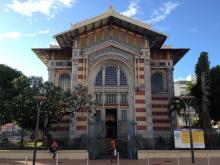Students have long had a number of options for studying in France, but programs operating in the francophone world beyond the borders of Europe remain scarce. Professor Richard Watts has established a new study abroad program in Martinique, a former French colony and present-day overseas department (think Hawai'i in relation to the United States), which will take place during Summer quarter 2013 (A-term).
Martinique is arguably the most significant of France's overseas possessions, but it's a place that US students are rarely exposed to. In fact, there is, to Dr. Watt's knowledge, only one other such program being offered nationally. He has been conducting literary and cultural studies research in Martinique since the early 1990s and thought it would be an ideal place to take UW students for a summer month to study two related phenomena: one, how France continues to exercise its cultural influence on an island whose population is of mixed Amerindian, African, East Indian, and European descent and, two, how that influence plays out in the sphere of human relations to the environment--in brief, a program in environmental cultural studies in Martinique.
On an island where 'natural beauty' plays a major role in the perception we have of it, the memory of past transformations of nature as a result of the slavery and plantation economies of the 17th to early 20th centuries and the current lived experience of the transformation of nature at the hands of intensive agriculture and economic development are complicated matters...
Dr. Watts explains, "On an island where 'natural beauty' plays a major role in the perception we have of it, the memory of past transformations of nature as a result of the slavery and plantation economies of the 17th to early 20th centuries and the current lived experience of the transformation of nature at the hands of intensive agriculture and economic development are complicated matters, and these matters are treated by a variety of local authors, artists, and activists. We will study their works on site, with the aim of understanding not only how the ecological change gets registered locally, but also how Martinican responses to the problem of environmental degradation resonates with responses elsewhere in the Caribbean and beyond."
For more information about this exciting new program, see our page about Environmental Cultural Studies in the French Caribbean or visit the UW Study Abroad page about this program.
